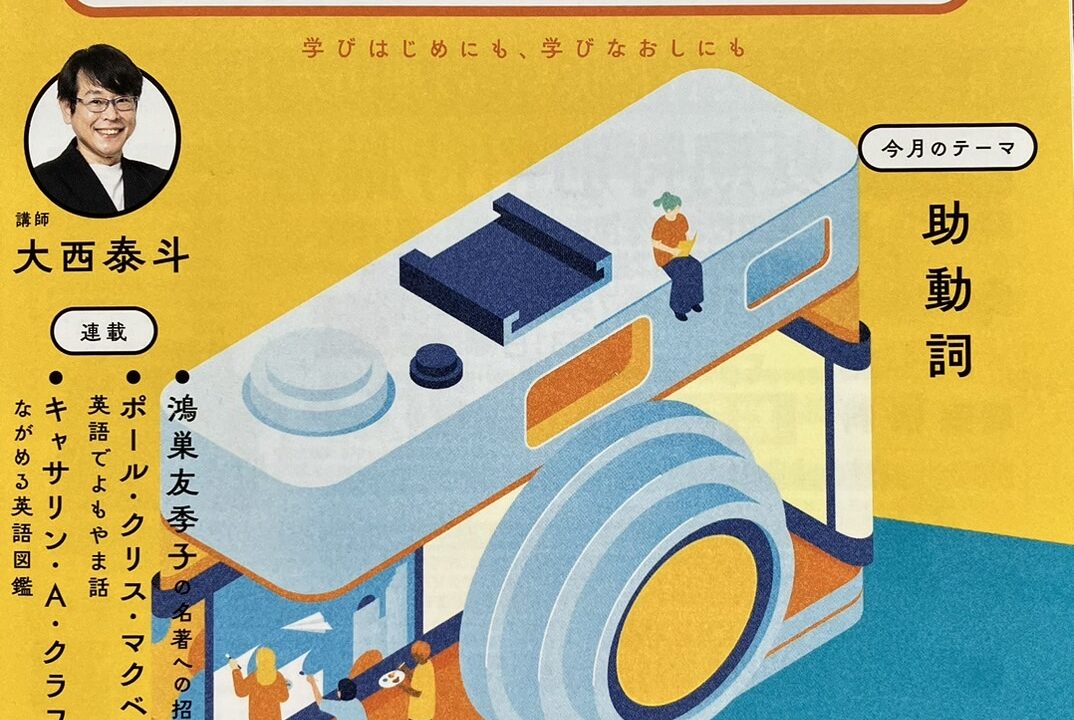【ラジオ英会話】Lesson 91 willの見通す② – 意志 – August 19 Monday, 2024

August 19 Monday, 2024
Lesson 91 willの見通す② – 意志
☆Words & Phrases
**bring me here:
Why did you bring me here, Jeannie?
**expand one’s horizons:
You need to expand your horizons, Frankie.
**guess:
Now, look at this picture. Can you guess who this person in the painting is?
**next to ~:
You’re standing next to her.
**at home:
Sally, my friend from art school. – It looks at home in this gallery.
I’ll tell her you said that.
☆Grammar and Vocabulary
Who painted it?
主語を尋ねるwh疑問文
wh疑問文は、通常「空所・wh語・疑問形」の「3点セット」から成り立つが、主語を尋ねる場合だけは別!
この場合、主語位置にwh語をポン!と置くだけで疑問文の出来上がり。
この文では主語の位置にwhoを置き「誰がそれを描いたのですか?」となっている。
It looks at home in this gallery.
説明型オーバーラッピング(SVC)
be動詞を典型動詞とする説明型(SVC)の発展パターン。
基本的な意味はbe動詞文と同様、
It = at home
ただ、ここでは実質的な意味を持つ「look」が動詞であるため「look」の意味が文全体に「オーバーラップ」し
It = at home [に見える]
となる。

☆Target Forms
I’ll give you a hint.
この文の will は「意志(~するよ)」で、未来を眺め、そこで積極的に行為を起こすことを決める。
be going to が「意図(~するつもり)」を表し(のちの放送で出てきます!)あらかじめそうした心積もりを持っていることを示すのとは対照的。
will はその場で「~するよ」と決心が行われる。
この文でも話し手は、その場で「ヒントをあげます」と決めている。
Practice
この will は頭の中で「カチッ」と意志決定のクリック音が鳴る意識を伴います。「わから ない」と言われて「ヒントをあげるよ」とカチッと意志決定。この意識が大切です。
I’ll give you a hint.
① I’ll tell her you said that.
→ 良い感想を言われて、その場でカチッと意志決定
② I won’t tell anybody your secret.
→ won’t (=will not) は「~しないよ」という意志を表す
③ I WILL marry him, no matter what!
→「そんなの無理だよ」といった発言をはね返している。ガチッとした強さを与えるなら will を強く発音する
※ WILL は will が強く発音されていることを表しています!
★Practice
D: All right, everyone. It’s time for today’s practice. “Will” has a couple of nuances and we use an intonation to help distinguish between them. So let’s practice different forms of that today.
R: Repeat after us, guys,
– I’ll, I’ll
– I’ll tell her you said that.
D: Nice work! Here’s our next,
– I won’t, I won’t
– I won’t tell anybody your secret.
R: Keep going,
– I WILL, I WILL
– I WILL marry him, no matter what!
D: Unlock your potential.
R: Repetition is the key!
D&R: Great work.
☆Grammar in Action
①私はあなたにかけ直します。今電車に乗っているのです。
②私はその箱を開けません、乙姫。約束します。でも、中に何が入っているのですか?
**though:
③私はいつの日にか英語を流暢に話します。それは単に時間の問題ですよ。
**fluently:
★Ending
O: Hey David, you like Urashima Taro, huh?
D: Twenty years ago, I had a homestay in Japan. And before I went home, my homestay family gave me this uh… puzzle box and told me “Remember this trip but don’t open the box”. So I’m always reminded of this story.
O: And what did you do? You open it?
D: Of course! First thing!
August 19 Monday, 2024
Lesson 91 willの見通す② – 意志
(日本語訳・解説付き)
☆Words & Phrases
**bring me here: 私をここに連れてくる
Why did you bring me here, Jeannie?
どうして僕をここに連れてきたんだい、ジーニー?
**expand one’s horizons: (人) の視野を広げる
You need to expand your horizons, Frankie.
あなたは視野を広げる必要があるわ、フランキー。
※horizon は「地平線」や「水平線」という意味です。ここでの horizons は「知識や経験の限界」を表していて、それを広げていく=視野を広げる、になります!horizons と複数形になるのは、広げるべき視野は1つではなく、さまざまな領域や方向に及ぶためです
**guess: 推測する
Now, look at this picture. Can you guess who this person in the painting is?
じゃあ、ここにある絵を見てちょうだい。絵の中の人が誰だかわかる?
※Can you guess の後ろ、who this person in the painting is は wh節で、疑問の意味を持たない文の部品です!
**next to ~: ~の隣に、~のすぐそばに
You’re standing next to her.
あなたは、彼女の隣に立っているの。
**at home: 居心地が良い、しっくりくる
Sally, my friend from art school. – It looks at home in this gallery.
サリーよ、美術教室の友達の – この絵はこのギャラリーの雰囲気によく溶け込んでいるね。
※「美術教室の」友達、と言うときは、my friend from art school なんですね! my friend of art school とすると「美術教室に所属している友達」のような意味に取られるようです(ついつい言ってしまいがちなのですが…)
I’ll tell her you said that.
彼女に、あなたがそう言ってくれたと伝えておくわ。
※I’ll tell her の内容を後ろの節 you said that が説明するリポート文の形です
☆Grammar and Vocabulary
Who painted it?
誰がそれを描いたのですか?
主語を尋ねるwh疑問文
wh疑問文は、通常「空所・wh語・疑問形」の「3点セット」から成り立つが、主語を尋ねる場合だけは別!
この場合、主語位置にwh語をポン!と置くだけで疑問文の出来上がり。
この文では主語の位置にwhoを置き「誰がそれを描いたのですか?」となっている。
It looks at home in this gallery.
それは、このギャラリーになじんでいるように見えます。
説明型オーバーラッピング(SVC)
be動詞を典型動詞とする説明型(SVC)の発展パターン。
基本的な意味はbe動詞文と同様、
It = at home
ただ、ここでは実質的な意味を持つ「look」が動詞であるため「look」の意味が文全体に「オーバーラップ」し
It = at home [に見える]
となる。

☆Target Forms
I’ll give you a hint.
私はあなたにヒントをあげます。
この文の will は「意志(~するよ)」で、未来を眺め、そこで積極的に行為を起こすことを決める。
be going to が「意図(~するつもり)」を表し(のちの放送で出てきます!)あらかじめそうした心積もりを持っていることを示すのとは対照的。
will はその場で「~するよ」と決心が行われる。
この文でも話し手は、その場で「ヒントをあげます」と決めている。
Practice
この will は頭の中で「カチッ」と意志決定のクリック音が鳴る意識を伴います。「わから ない」と言われて「ヒントをあげるよ」とカチッと意志決定。この意識が大切です。
I’ll give you a hint.
① I’ll tell her you said that.
彼女に、あなたがそう言ったと伝えますよ。
→ 良い感想を言われて、その場でカチッと意志決定
② I won’t tell anybody your secret.
あなたの秘密は誰にも言いませんよ。
→ won’t (=will not) は「~しないよ」という意志を表す
③ I WILL marry him, no matter what!
何があろうと彼と結婚します!
→「そんなの無理だよ」といった発言をはね返している。ガチッとした強さを与えるなら will を強く発音する
※ WILL は will が強く発音されていることを表しています!
★Practice
D: All right, everyone. It’s time for today’s practice. “Will” has a couple of nuances and we use an intonation to help distinguish between them. So let’s practice different forms of that today.
R: Repeat after us, guys,
– I’ll, I’ll
– I’ll tell her you said that.
D: Nice work! Here’s our next,
– I won’t, I won’t
– I won’t tell anybody your secret.
R: Keep going,
– I WILL, I WILL
– I WILL marry him, no matter what!
D: Unlock your potential.
R: Repetition is the key!
D&R: Great work.
☆Grammar in Action
①私はあなたにかけ直します。今電車に乗っているのです。
I’ll call you back. I’m on the train right now.
※「電車」は広い場所であるため「乗っている」は「上に乗っている (on)」が選ばれます
②私はその箱を開けません、乙姫。約束します。でも、中に何が入っているのですか?
I won’t open the box, Oto-hime. I promise. What’s inside, though?
**though: でも、でもね、だけど
※文末につけ加えて「でもね」「だけど」という意味を補足的に加えます。この場合は副詞です!
③私はいつの日にか英語を流暢に話します。それは単に時間の問題ですよ。
I WILL speak English fluently someday. It’s just a matter of time.
**fluently: 流ちょうに
※ someday は「いつか」で、将来の漠然としたある時点を指します。ちなみに some day は「特定のある1日」を指します。つまり「ある日、具体的には決まっていないがいつか特定の日に」という感じです!
★Ending
O: Hey David, you like Urashima Taro, huh?
D: Twenty years ago, I had a homestay in Japan. And before I went home, my homestay family gave me this uh… puzzle box and told me “Remember this trip but don’t open the box”. So I’m always reminded of this story.
20年前に日本でホームステイをしてたんだ。帰る前に、ホストファミリーがこの…パズルボックスをくれて「この旅行を忘れないでね、でも箱は開けないで」って言われたんだ。それで、この話をいつも思い出すんだよね。
O: And what did you do? You open it?
それでどうしたの?開けたの?
D: Of course! First thing!
もちろん!まず最初に開けたよ!
名古屋駅前にあるビジネス英語&仕事での英語雑談力をつけるための「名古屋BEGビジネス英会話ジム」
営業時間:平日 9:00~22:00 土曜日 9:00~19:00(日祝休み)
〒450-0002 愛知県名古屋市中村区名駅2丁目40-16 名駅野村ビル 5階


